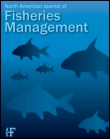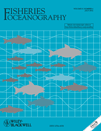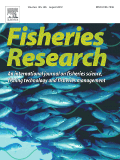
NORTH AMERICAN JOURNAL OF FISHERIES MANAGEMENT
Scope & Guideline
Empowering Research for Responsible Fisheries Practices
Introduction
Aims and Scopes
- Fish Population Dynamics:
Research on the population dynamics of various fish species, including growth, mortality, recruitment, and demographic trends, helps inform management practices. - Fisheries Management Strategies:
Studies exploring different management strategies, including regulations, stocking practices, and habitat restoration, aimed at enhancing fish populations and fisheries sustainability. - Ecological Interactions:
Investigations into the interactions between fish and their environments, such as predation, competition, and the impacts of invasive species on native fish populations. - Conservation and Restoration:
Research focused on the conservation of threatened or endangered fish species and the restoration of degraded habitats to improve ecological integrity. - Innovative Research Techniques:
Development and application of new methodologies such as environmental DNA (eDNA) sampling, acoustic telemetry, and genetic analyses to enhance fisheries research. - Human Dimensions of Fisheries:
Studies examining the socio-economic aspects of fisheries, including angler behavior, stakeholder engagement, and the impact of recreational fishing on fish populations.
Trending and Emerging
- Environmental DNA (eDNA) Applications:
Recent publications highlight the rising use of eDNA techniques for monitoring fish populations and biodiversity, reflecting a shift towards non-invasive and efficient sampling methods. - Climate Change Impact Studies:
Research focusing on the effects of climate change on fish habitats, populations, and management strategies is increasingly prevalent, indicating a growing recognition of this critical issue. - Integrated Fisheries Management:
There is a trend towards studies that integrate ecological, social, and economic factors in fisheries management, promoting a more holistic approach to sustainability. - Technological Advancements in Monitoring:
The use of advanced technologies such as acoustic telemetry and remote sensing for monitoring fish behavior and habitats is gaining momentum, facilitating more effective management strategies. - Community Engagement and Stakeholder Perspectives:
Emerging research emphasizes the importance of engaging local communities and stakeholders in fisheries management decisions, reflecting a shift towards participatory management approaches.
Declining or Waning
- Traditional Stock Assessment Methods:
There has been a noticeable reduction in papers focusing solely on traditional stock assessment methods, as newer and more integrated approaches are gaining traction. - Invasive Species Management:
Although still important, the frequency of studies solely dedicated to invasive species management has decreased as researchers increasingly incorporate this issue into broader ecological and fisheries context. - Historical Fisheries Data Analysis:
Research relying heavily on historical data analysis has waned, with a shift towards real-time data collection and modeling approaches that provide more immediate insights. - Single Species Focus:
There is a declining trend in studies that focus exclusively on single species management, with an increasing preference for multi-species and ecosystem-based management approaches.
Similar Journals

INDIAN JOURNAL OF FISHERIES
Advancing aquatic science for sustainable fisheries.Welcome to the Indian Journal of Fisheries, an esteemed publication of the Central Marine Fisheries Research Institute, dedicated to advancing the field of aquatic sciences. Established in 1974, this journal serves as a crucial platform for researchers, professionals, and students interested in the dynamics of fishery research within the Indian context and beyond. With an impact factor highlighting its rigorous peer-review standards, the journal publishes research that significantly contributes to the understanding of fisheries management, conservation, and sustainable practices. Although currently categorized in Q4 for Aquatic Science (2023) and ranked #215 out of 247 in Scopus, its increasing visibility demonstrates the journal's dedication to enriching the scientific discourse surrounding aquatic ecosystems. Located in Kochi, India, and published intermittently from 1977 to 2024, it seeks to bridge knowledge gaps while promoting innovative methodologies in fishery sciences. While not an open-access journal, it fosters a vital exchange of scholarly work that informs fishing practices, policy, and ecological considerations vital to both national and global fisheries. Join us in exploring the intricate world of fisheries through our comprehensive collection of research articles, reviews, and case studies.

ISRAELI JOURNAL OF AQUACULTURE-BAMIDGEH
Elevating the standards of aquaculture studies since 1988.Welcome to the Israeli Journal of Aquaculture-Bamidgeh, published by AquacultureHub Inc, a pivotal platform dedicated to advancing the field of aquaculture studies since its inception in 1988. With a focus on innovative research and practical applications within the realms of Agronomy and Aquatic Sciences, this journal has established a reputation for disseminating high-quality findings that contribute to sustainable practices in aquatic farming. The journal, although classified in the Q3 and Q4 quartiles for its respective categories, offers valuable insights for researchers and practitioners alike, allowing them to stay abreast of developments in aquaculture challenges and solutions. While it's currently not an Open Access journal, the Israeli Journal of Aquaculture-Bamidgeh is committed to providing a thorough avenue for scholarly exchange and fostering collaborations across the global aquaculture community. Explore impactful studies and the latest trends to enhance your knowledge and research in this vital sector.

FISHERIES OCEANOGRAPHY
Innovating Fisheries Research for a Sustainable FutureFisheries Oceanography, published by Wiley, is a leading peer-reviewed journal that focuses on the intricate dynamics of marine ecosystems and the interactions between physical and biological processes in ocean environments. With an ISSN of 1054-6006 and E-ISSN of 1365-2419, this esteemed journal has firmly established itself as a valuable resource for researchers and practitioners in the fields of Aquatic Science and Oceanography, ranking in the top quartile (Q1) in both categories as of 2023. Since its inception in 1992, it has provided a platform for the dissemination of innovative research and practical applications in fisheries and marine resource management, contributing significantly to the understanding of oceanic systems. With an impactful presence evidenced by its Scopus rankings, including a position of #60 out of 247 in Aquatic Science and #41 out of 145 in Oceanography, the journal seeks to further advance knowledge and foster collaboration among the global scientific community. Although not an open access journal, it remains committed to maintaining high standards in scholarly publishing, ensuring that critical advancements in oceanography are readily accessible to professionals and academics alike.

Journal of Ichthyology
Navigating the Waters of Fish Research and EcologyJournal of Ichthyology, published by PLEIADES PUBLISHING INC, is a respected periodical in the field of aquatic sciences and biological studies, focusing extensively on the study of fish and their ecosystems. With an ISSN of 0032-9452 and E-ISSN of 1555-6425, this journal serves as an essential platform for researchers seeking to publish innovative findings related to ichthyology and broader aquatic biological sciences. Although currently not an open-access journal, its high relevance is reflected in its impact factor and varied audience, addressing pressing issues in biodiversity, conservation efforts, and fish biology. The journal's classification indicates a Q3 ranking in Agricultural and Biological Sciences and a Q4 ranking in Aquatic Science for 2023, affirming its contributions to the field despite its percentile standings in Scopus ranking. The journal has a publication history that spans critical converged years from 1976 to 2024, making it a vital resource for ongoing research developments and scholarly discourse. For academics, professionals, and students alike, the Journal of Ichthyology remains a key resource for advancing knowledge and enhancing the understanding of fish biology and their ecological impacts.

FISHERIES SCIENCE
Navigating the future of aquatic resource management.Fisheries Science, published by Springer Japan KK, is a renowned journal in the field of aquatic science, effectively bridging the gap between scientific research and practical application in fisheries management. With an ISSN of 0919-9268 and an E-ISSN of 1444-2906, this journal serves as a vital resource for researchers, professionals, and students interested in advancing their knowledge and understanding of aquatic ecosystems and fishery practices. Operating within a competitive landscape, Fisheries Science has achieved a respectable ranking in Scopus, placing 96th out of 247 journals in the Agricultural and Biological Sciences > Aquatic Science category, showcasing its integral role in contributing to this dynamic field. The journal encompasses a wide range of topics from sustainable development to conservation strategies, aiming to foster collaborative research and innovative solutions to the challenges facing fisheries today. While not an open-access journal, Fisheries Science remains a key publication for those dedicated to marine science and the sustainable management of aquatic resources, with a historical footprint extending from 1994 to 2024.

FISHERIES MANAGEMENT AND ECOLOGY
Fostering collaboration for resilient aquatic ecosystems.Fisheries Management and Ecology, an esteemed journal published by Wiley, serves as a critical platform for researchers, practitioners, and policymakers in the fields of aquatic science and ecology. With an ISSN of 0969-997X and an E-ISSN of 1365-2400, this journal has been at the forefront of advancing knowledge and best practices in sustainable fisheries management since its inception in 1994. Hailing from the United Kingdom, it has steadily distinguished itself with a respectable impact factor and is currently ranked Q2 in both Aquatic Science and Ecology categories, evidencing its scholarly relevance. The journal not only covers a broad spectrum of topics related to fishery ecology and management, but also emphasizes the importance of interdisciplinary approaches to tackle the myriad challenges facing aquatic ecosystems today. It is indexed in reputable databases and boasts commendable Scopus rankings, making it a valuable resource for anyone invested in the sustainable use of aquatic resources. This commitment to accessibility and engagement, although not open access, ensures that critical research remains a cornerstone for ongoing discussions in the field.

FISHERIES RESEARCH
Pioneering research in fish population dynamics.Fisheries Research, published by Elsevier, is a leading international journal dedicated to the advancement and dissemination of research in the field of aquatic science. With an ISSN of 0165-7836 and E-ISSN 1872-6763, this influential journal has been pivotal in shaping fisheries management and conservation strategies since its inception in 1981. As a distinguished publication ranked in the Q1 category for Aquatic Science in 2023, it holds a prestigious position, reflected in its Scopus ranking of 73/247 in Agricultural and Biological Sciences. Fisher fisheries research encompasses a diverse array of topics such as fish population dynamics, ecosystem management, and sustainable practices, making it an essential resource for researchers, professionals, and students alike. Although it currently does not offer Open Access, the journal remains a crucial platform for disseminating high-quality research and fostering dialogue within the aquatic science community. With its address at Radarweg 29, 1043 NX Amsterdam, Netherlands, Fisheries Research continues to contribute significantly to the global discourse on fisheries science and management.

FISHERY BULLETIN
Advancing Sustainable Fisheries KnowledgeFISHERY BULLETIN, published by the NATL MARINE FISHERIES SERVICE SCIENTIFIC PUBL OFFICE, serves as a pivotal resource in the field of Aquatic Science, offering valuable insights into fisheries science and management since its inception in 1881. With an Open Access model, the journal ensures that researchers, professionals, and students can access cutting-edge research freely, fostering greater collaboration and innovation within the community. The journal boasts a substantial history of publication, encompassing articles from 1979 to 2024, and has achieved a respectable Q3 Quartile ranking in its category for 2023, highlighting its influence amid its peers. It currently ranks #161 out of 247 in the Scopus database for Agricultural and Biological Sciences, with a 35th percentile ranking, indicative of the quality and relevance of its contributions. The FISHERY BULLETIN stands out as an essential platform for disseminating significant findings and advancing knowledge relevant to sustainable fisheries and marine resource management, making it an indispensable tool for academic researchers and industry practitioners alike.

CANADIAN JOURNAL OF FISHERIES AND AQUATIC SCIENCES
Exploring the depths of fisheries and ecological innovation.The Canadian Journal of Fisheries and Aquatic Sciences, published by Canadian Science Publishing, stands as a premier interdisciplinary journal dedicated to advancing knowledge in the fields of aquatic sciences, ecology, and evolutionary biology. With a longstanding history of publication since 1980, this journal delivers high-quality, peer-reviewed research that contributes to the understanding of aquatic ecosystems and the sustainable management of fisheries. The journal is esteemed for its rigorous standards and currently holds a Q1 ranking in both Aquatic Science and Ecology, Evolution, Behavior, and Systematics as of 2023, evidencing its significant impact in these critical areas. Researchers, professionals, and students alike can expect compelling explorations of both fundamental and applied aspects of aquatic sciences. While the journal offers traditional access, it remains committed to disseminating pivotal research findings to foster a vibrant community of scholars and practitioners striving towards innovative solutions for aquatic environmental challenges.

Journal of Fish and Wildlife Management
Empowering biodiversity through critical insights.The Journal of Fish and Wildlife Management, published by the U.S. Fish & Wildlife Service, serves as a vital resource for scholars, researchers, and professionals in the fields of Animal Science, Ecology, and Conservation Biology. With its ISSN 1944-687X, this esteemed journal has been disseminating critical research findings since 2010, contributing significantly to the understanding of fish and wildlife conservation practices and their ecological impacts. Despite its Q3 category rankings in various disciplines as of 2023, it provides a platform for innovative research that influences policy and management strategies for biodiversity conservation. The journal, although not open access, remains committed to advancing the scientific discourse surrounding wildlife management with articles that emphasize practical conservation efforts and ecological sustainability. Readers can expect a diverse range of articles that promote best practices in the management and conservation of fish and wildlife resources, furthering our collective mission of preserving ecological health and biodiversity for future generations.